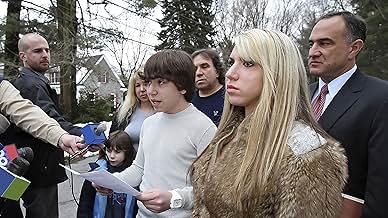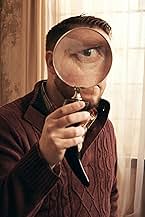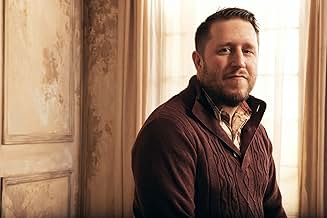Aggiungi una trama nella tua linguaA teen's life is upended when his school accuses him of dealing drugs using a photo from his bedroom. His family's lawsuit reveals a shocking scandal that sparks FBI involvement and raises a... Leggi tuttoA teen's life is upended when his school accuses him of dealing drugs using a photo from his bedroom. His family's lawsuit reveals a shocking scandal that sparks FBI involvement and raises alarming questions about student privacy.A teen's life is upended when his school accuses him of dealing drugs using a photo from his bedroom. His family's lawsuit reveals a shocking scandal that sparks FBI involvement and raises alarming questions about student privacy.
- Premi
- 1 vittoria in totale
Sfoglia gli episodi
Recensioni in evidenza
This four-part Amazon Prime documentary series is interesting on many levels. First, there is the whole idea that a school district can single out students for surveillance through their school-issued laptops. Then, there is the back-and-forth social media, from support to personal attacks. Add to this the sleezy side of the legal part of the story, and then the racial disparity in the final outcome. There's also a class and culture component. It all comes together in a fascinating story that changes minute by minute.
It all starts when student, Blake Robbins, is called into the principal's office to explain a photo taken of him that appears to be a picture of him taking drugs. The problem is not so much the allegation of drug use, it's that the photo was taken from his laptop computer while he was at home. That sets off a lawsuit where it is learned that the school district had installed security software on school-issued laptops that allows them to operate the webcam remotely.
Through discovery, the lawyer representing Blake learns that the security software was intended to help authorities track down stolen laptops. Instead, they learn that someone at the school district was using the feature to find incriminating images against students they deemed troublemakers. I say someone because no single employee was identified.
The spying story propels the first episode. As word gets out about the lawsuit, Blake receives support from fellow students and others. That support, however, is short-lived as the tides turn against him and his family due to the perception that they are in it just for the money. It swings back in his favor when word gets out that the spying involved more than just Blake and that the number of images collected surpassed 56,000.
Two more students, both minority black students, are added to the lawsuit. The lawyer who uncovers the truth behind the spying comes across as someone genuinely interested in bringing attention to the problem and advocating for his clients. By the end of the series, however, any respect the lawyer may have garnered early on goes out the window when it becomes apparent that his motivation appears to be more about his potential payout than it is about penalizing the school district.
I won't ruin the ending, but while Blake does get some payback against the school, the disparity in what happens to everyone else involved makes you dislike the legal system.
It all starts when student, Blake Robbins, is called into the principal's office to explain a photo taken of him that appears to be a picture of him taking drugs. The problem is not so much the allegation of drug use, it's that the photo was taken from his laptop computer while he was at home. That sets off a lawsuit where it is learned that the school district had installed security software on school-issued laptops that allows them to operate the webcam remotely.
Through discovery, the lawyer representing Blake learns that the security software was intended to help authorities track down stolen laptops. Instead, they learn that someone at the school district was using the feature to find incriminating images against students they deemed troublemakers. I say someone because no single employee was identified.
The spying story propels the first episode. As word gets out about the lawsuit, Blake receives support from fellow students and others. That support, however, is short-lived as the tides turn against him and his family due to the perception that they are in it just for the money. It swings back in his favor when word gets out that the spying involved more than just Blake and that the number of images collected surpassed 56,000.
Two more students, both minority black students, are added to the lawsuit. The lawyer who uncovers the truth behind the spying comes across as someone genuinely interested in bringing attention to the problem and advocating for his clients. By the end of the series, however, any respect the lawyer may have garnered early on goes out the window when it becomes apparent that his motivation appears to be more about his potential payout than it is about penalizing the school district.
I won't ruin the ending, but while Blake does get some payback against the school, the disparity in what happens to everyone else involved makes you dislike the legal system.
Spy High: When Laptops Become Snitches and Privacy Takes a Sick Day
Spy High, the docuseries that's like *The Office* meets *Black Mirror*-if Michael Scott accidentally activated a surveillance state in a Philly suburb. Directed by Jody McVeigh-Schultz and backed by Mark Wahlberg's Unrealistic Ideas (a name that's either ironic or prophetic), revisits a 2010 scandal where a school-issued MacBook turned into Big Brother's favorite toy.
Imagine being 15, accused of drug dealing because your school remotely snapped a pic of you in your bedroom. Blake Robbins' saga starts here, blending teenage angst with Orwellian vibes. The series nails the absurdity: administrators playing NSA with webcams, parents oscillating between outrage and "wait, they did what?", and Blake's family becoming accidental media darlings (until their past legal drama stole the spotlight).
The show's genius lies in making you laugh before you gasp. Yes, schools spying on kids is dystopian, but watching Blake pause an interview to ask Siri for a Senator's name? The series dives into the creep factor of tech overreach, asking: "If your laptop's watching, is it also judging your Spotify playlists?" Spoiler: The answer is yes, and it's definitely side-eyeing your My Chemical Romance phase.
Here's where *Spy High* gets real. While Blake's family hogs the drama, the series quietly highlights how Black students faced disproportionate targeting. It's the "oh, and also racism" subplot we wish was fictional. The show doesn't fully unpack this-prioritizing Blake's main character energy-but it's a grim reminder that surveillance tools often mirror society's biases.
Social Cohesion? More Like Social Collision: The fallout is a masterclass in how not to build community trust. Parents vs. Admins, classmates side-eyeing each other, and a town learning the hard way that "protecting kids" can mean "destroying privacy." The Robbins family's 15 minutes of fame-complete with talk-show tours-shows how quickly solidarity crumbles when skeletons (and lawsuits) enter the chat.
Spy High succeeds as a dark comedy with a conscience, even if it occasionally gets lost in its own webcam footage. It's a bingeable cautionary tale which presents the dilemma modern technology poses for us. It's a mix of cringe, chaos, and covert ops that'll make you side-eye your kid's school iPad. Also, maybe unplug your webcam.
Spy High, the docuseries that's like *The Office* meets *Black Mirror*-if Michael Scott accidentally activated a surveillance state in a Philly suburb. Directed by Jody McVeigh-Schultz and backed by Mark Wahlberg's Unrealistic Ideas (a name that's either ironic or prophetic), revisits a 2010 scandal where a school-issued MacBook turned into Big Brother's favorite toy.
Imagine being 15, accused of drug dealing because your school remotely snapped a pic of you in your bedroom. Blake Robbins' saga starts here, blending teenage angst with Orwellian vibes. The series nails the absurdity: administrators playing NSA with webcams, parents oscillating between outrage and "wait, they did what?", and Blake's family becoming accidental media darlings (until their past legal drama stole the spotlight).
The show's genius lies in making you laugh before you gasp. Yes, schools spying on kids is dystopian, but watching Blake pause an interview to ask Siri for a Senator's name? The series dives into the creep factor of tech overreach, asking: "If your laptop's watching, is it also judging your Spotify playlists?" Spoiler: The answer is yes, and it's definitely side-eyeing your My Chemical Romance phase.
Here's where *Spy High* gets real. While Blake's family hogs the drama, the series quietly highlights how Black students faced disproportionate targeting. It's the "oh, and also racism" subplot we wish was fictional. The show doesn't fully unpack this-prioritizing Blake's main character energy-but it's a grim reminder that surveillance tools often mirror society's biases.
Social Cohesion? More Like Social Collision: The fallout is a masterclass in how not to build community trust. Parents vs. Admins, classmates side-eyeing each other, and a town learning the hard way that "protecting kids" can mean "destroying privacy." The Robbins family's 15 minutes of fame-complete with talk-show tours-shows how quickly solidarity crumbles when skeletons (and lawsuits) enter the chat.
Spy High succeeds as a dark comedy with a conscience, even if it occasionally gets lost in its own webcam footage. It's a bingeable cautionary tale which presents the dilemma modern technology poses for us. It's a mix of cringe, chaos, and covert ops that'll make you side-eye your kid's school iPad. Also, maybe unplug your webcam.
Despite my personal interests regarding this extraordinarily disturbing issue, I've noticed other problems that make this story difficult to believe! I can understand that the parents of these students don't seem to be articulate or educated . I do however wonder why most of the students featured seem to possess the education of an elementary school dropout!!! This school district is purportedly wealthy and extremely sought out as a very highly recommended institution of learning..grammar is the basis of learning, but most of the students interviewed possess the education of a 10 year old. Where is all of the money being spent?
ALSO.... IT WAS PUBLIC KNOWLEDGE AFTER 9/11 to cover webcams for privacy. AGAIN....poor educational providers from an alledgedly wealthy and highly regarded educational institution.
People should really spend less time gaming or on social media....but actually investigate safety/security measures!
.
ALSO.... IT WAS PUBLIC KNOWLEDGE AFTER 9/11 to cover webcams for privacy. AGAIN....poor educational providers from an alledgedly wealthy and highly regarded educational institution.
People should really spend less time gaming or on social media....but actually investigate safety/security measures!
.
This is really a roller coaster of a story, which has so many twists and turns and too be honest, very few likeable characters.
The whole story initially revolves around one boy. He is called to his vice principles office and accused of dealing drugs, and is shown a photo, taken from his laptop camera in his bedroom. He immediately informs his parents who start a lawsuit against the school district. The students have been given Laptops by the school to use at home, which includes some security software. Part of it's function is to track the PC in case it is lost or stolen, which is fair enough. But it has the ability to turn on the built in camera and take stills and videos to trace any thieves. But when photos surface of a student asleep in his own bedroom on top of the alleged drug dealing, it goes ballistic. The biggest thing I took from this was that nobody came out of this looking good. The main kid, now in his twenties, comes across as quite obnoxious throughout. The parents courted publicity and chased dollars. The Lawyer, surprise surprise, was the biggest winner, and again, just seemed to stir up controversy for the publicity. The community, at first supportive, then turned on them, then back. The school completely overstepped any boundaries and were very guilty of invasion of privacy. However the actions of those involved and the circus that it became overshadowed any sense of justice or resolution. A fascinating, if frustrating view into the culture and social machinations of well to do America.
The whole story initially revolves around one boy. He is called to his vice principles office and accused of dealing drugs, and is shown a photo, taken from his laptop camera in his bedroom. He immediately informs his parents who start a lawsuit against the school district. The students have been given Laptops by the school to use at home, which includes some security software. Part of it's function is to track the PC in case it is lost or stolen, which is fair enough. But it has the ability to turn on the built in camera and take stills and videos to trace any thieves. But when photos surface of a student asleep in his own bedroom on top of the alleged drug dealing, it goes ballistic. The biggest thing I took from this was that nobody came out of this looking good. The main kid, now in his twenties, comes across as quite obnoxious throughout. The parents courted publicity and chased dollars. The Lawyer, surprise surprise, was the biggest winner, and again, just seemed to stir up controversy for the publicity. The community, at first supportive, then turned on them, then back. The school completely overstepped any boundaries and were very guilty of invasion of privacy. However the actions of those involved and the circus that it became overshadowed any sense of justice or resolution. A fascinating, if frustrating view into the culture and social machinations of well to do America.
Trama
I più visti
Accedi per valutare e creare un elenco di titoli salvati per ottenere consigli personalizzati
Dettagli
- Tempo di esecuzione2 ore 29 minuti
Contribuisci a questa pagina
Suggerisci una modifica o aggiungi i contenuti mancanti








